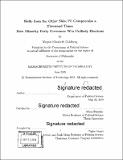| dc.contributor.advisor | Adam Berinsky. | en_US |
| dc.contributor.author | Goldberg, Megan Elizabeth. | en_US |
| dc.contributor.other | Massachusetts Institute of Technology. Department of Political Science. | en_US |
| dc.date.accessioned | 2020-01-23T17:01:47Z | |
| dc.date.available | 2020-01-23T17:01:47Z | |
| dc.date.copyright | 2019 | en_US |
| dc.date.issued | 2019 | en_US |
| dc.identifier.uri | https://hdl.handle.net/1721.1/123634 | |
| dc.description | Thesis: Ph. D., Massachusetts Institute of Technology, Department of Political Science, 2019 | en_US |
| dc.description | Cataloged from PDF version of thesis. | en_US |
| dc.description | Includes bibliographical references (pages 117-131). | en_US |
| dc.description.abstract | Despite increasing nationalization and polarization in state politics, some blue states continue to elect Republican governors, while some red states continue to elect Democratic governors. These minority party governors are out of step with their state's mass ideology and partisanship when research on public opinion and voting behavior suggests that it should be fairly easy for voters to elect officials that match their own ideology by using partisan cues and other information shortcuts. How do these governors win elections and maintain relatively high approval ratings? This dissertation uses data and text from gubernatorial social media accounts from 2009 through 2017 to argue that minority party governors are able to defy electoral odds by distancing themselves from their national party, through the use of language to downplay their partisan identity and ideological moderation, and then emphasize non-ideological valence issues such as the economy, good governance, and public health to shift the focus from issues that are highly partisan. | en_US |
| dc.description.statementofresponsibility | by Megan Elizabeth Goldberg. | en_US |
| dc.format.extent | 131 pages | en_US |
| dc.language.iso | eng | en_US |
| dc.publisher | Massachusetts Institute of Technology | en_US |
| dc.rights | MIT theses are protected by copyright. They may be viewed, downloaded, or printed from this source but further reproduction or distribution in any format is prohibited without written permission. | en_US |
| dc.rights.uri | http://dspace.mit.edu/handle/1721.1/7582 | en_US |
| dc.subject | Political Science. | en_US |
| dc.title | Hello from the other side; I'll compromise a thousand times : how minority party governors win unlikely elections | en_US |
| dc.title.alternative | How minority party governors win unlikely elections | en_US |
| dc.type | Thesis | en_US |
| dc.description.degree | Ph. D. | en_US |
| dc.contributor.department | Massachusetts Institute of Technology. Department of Political Science | en_US |
| dc.identifier.oclc | 1136286049 | en_US |
| dc.description.collection | Ph.D. Massachusetts Institute of Technology, Department of Political Science | en_US |
| dspace.imported | 2020-01-23T17:01:46Z | en_US |
| mit.thesis.degree | Doctoral | en_US |
| mit.thesis.department | PoliSci | en_US |
